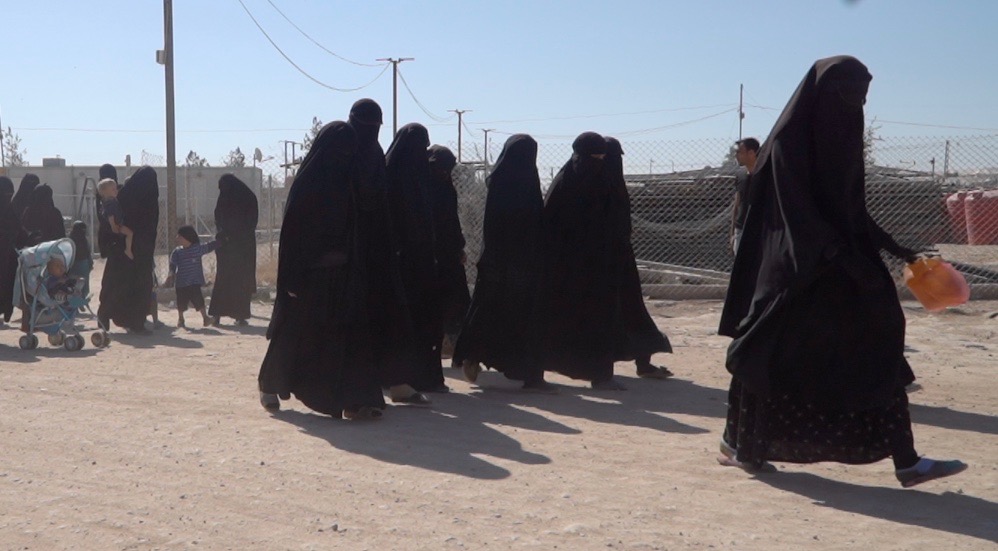A Canadian woman released from a camp for captured ISIS families “knows a lot” and has been cooperating with police, the former diplomat who got her out of Syria said Tuesday.

Peter Galbraith said the woman had been “helpful to law enforcement” while detained by U.S.-backed forces in northeast Syria, and intended to assist police in Canada as well.
“She knows a lot about what went on, and is fully prepared to cooperate,” said Galbraith, a former U.S. ambassador who secured the woman’s release from Roj Camp on the weekend.
The woman, who left Canada for Syria in 2014 and was taken prisoner during the war against ISIS, already helped alert the Syrian Democratic Forces (SDF) to a “humanitarian issue” at one of its camps, he said.
“She had discovered that a German woman was pretending that the child of her husband’s Yazidi slave was, in fact, her own child, and further that the German woman was abusing the child, who was I think a three-year-old boy,” Galbraith told Global News.
“And so she provided the information to me, and I was able to get the SDF to go into the camp, arrest the German woman and bring the child out of the camp to the orphanage.”
“All that I can say is that based on everything that I know about her, and based on her already existing cooperation with law enforcement, I’m sure she will be cooperative with the Canadian police at criminal investigations in Canada and in other countries,” he said.
The mother of a four-year-old brought home three months ago, the woman is the first Canadian adult captured in Syria to be released, setting the stage for her return to Canada.
After Global News first reported on the development Monday, Global Affairs Canada released a statement saying the government was not involved in securing her exit from northeast Syria.

Get breaking National news
She is currently in Erbil, Iraq.
Once she returns to Canada, she could face terrorism charges, a peace bond, surveillance, a threat assessment — and questions about who may have encouraged, financed and facilitated her journey to Syria.
Canada’s national security agencies view returning “extremist travellers” as a significant threat, but also acknowledge that finding evidence about what they did in Syria and Iraq is challenging.
“The safety and security of citizens is of the utmost importance to the RCMP, and we take any threat to the security of Canadians seriously,” the RCMP said in response to questions about the case.

Galbraith declined to name the city the woman intended to return to, but said Canadians need not worry about her.
“She was part of a group of women who have very explicitly rejected the Islamic State. They’ve been wearing Western clothes, they were not fasting during Ramadan, and they were being threatened,” he said.
“I can reassure Canadians that this individual — I’m not saying for all the Canadians — but that this individual does not pose a threat. I’m 100 per cent confident of that.”
The Autonomous Administration of North and East Syria (AANES), which controls the Kurdish-majority northeast region, cleared her, writing in a letter that she had committed no crimes, Galbraith said.
The letter said the woman was “charged of joining the terrorist organization of ISIS” and was investigated, but that “no sufficient evidence was found against her that proves her involvement” in breaking local laws, he said, reading from the document.
He said the letter was given to him when she was released.
“The AANES turned her over to me. I signed for her and I brought her into Iraqi Kurdistan, and now Canada’s embassy office in Erbil is assisting,” he said.
Galbraith also secured the release of the woman’s daughter in March. He said he assisted the mother partly to reunite the family.
“Of course, but the fact that she was not radical, the fact that she was helpful to law enforcement and helpful to a humanitarian issue were also factors.”
With the departure of the woman, at least 13 Canadian adults remain at the detention camps. Some have admitted to having served prominent roles in ISIS, including in its propaganda wing.
The United States and about 20 other countries have repatriated many of their citizens from the region and charged them with terrorism offences over their alleged involvement in ISIS.
But the Liberal government has claimed it cannot assist the Canadians because northeast Syria is too dangerous for consular officials.
So far, only two Canadian children have been brought home. About two dozen children of Canadians remain at the camps.
Galbraith said there were “legitimate security concerns” about the ISIS detainees, and that as a private individual, he was able to do things that serving diplomats could not.
“Canada is, in my view, reasonably concerned about what the people who went to Syria to join the Islamic State might subsequently do. I mean some of these people are dangerous, and that includes some of the women,” he said.
“It’s important to keep in mind that all these women went to Syria for the purpose of joining a terrorist organization. It may not have been a very informed decision, there may have been mental health issues, there may have been coercion issues.”
“But they all did that basically voluntarily, and there’s been so much focus on that, it’s important to keep in mind all the people who were victims of the Islamic State.”
Stewart.Bell@globalnews.ca








Comments
Want to discuss? Please read our Commenting Policy first.